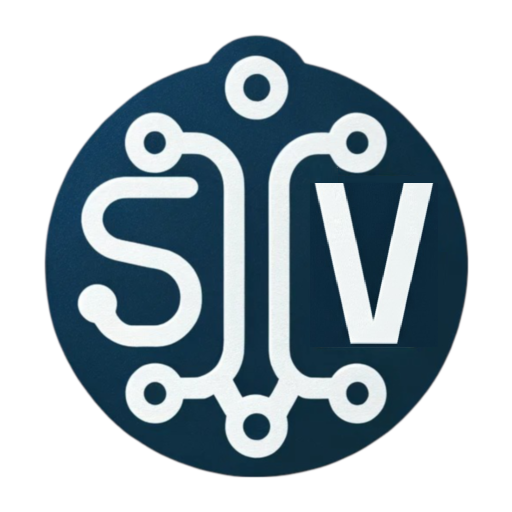
Best Reviewed
Disclosure for Our Readers
This blog contains affiliate links. If you make a purchase through one of these links, our team may earn a commission at no extra cost to you. Learn more. Thanks for your support!
You’re building a support team, and every “expert” tells you the same thing: just get Zendesk. It’s the industry standard, the behemoth, the default choice.
But then you see the price tag. You start exploring the complex setup. Suddenly, the “safe” choice doesn’t feel so safe anymore.
Zendesk is a powerful tool, but it’s not the only option. The market is filled with incredible platforms built for modern teams who value speed, simplicity, and affordability.
I set out to find the best Zendesk alternatives for 2025. It boiled down to these options that I hope will help you qualify the perfect customer service platform that fits your needs and budget.
Why Even Look for a Zendesk Alternative?
While Zendesk is a leader, its dominance has created opportunities for competitors to address its most common pain points. Teams often seek alternatives for three key reasons.
High Cost: Zendesk’s per-agent pricing, especially for its professional and enterprise tiers, can become incredibly expensive as your team scales.
Steep Learning Curve: According to online users, it’s a complex system. Unlocking its full potential requires significant time for setup, configuration, and training.
The Top Zendesk Alternatives: A Quick Comparison
For those in a hurry, here’s a quick look at our top picks that excel in specific areas.
| Alternative | Best For | Standout Feature |
|---|---|---|
| Freshdesk | Overall Value | Generous free forever plan |
| HubSpot Service Hub | CRM Integration | Unbeatable native CRM connection |
| Intercom | Proactive Support | Powerful sales & marketing bots |
| Help Scout | Simplicity & Ease of Use | Feels like a shared inbox |
A Deep Dive into the 14 Best Zendesk Alternatives
Every business is different. The right tool for a startup isn’t the right tool for an e-commerce giant. Let’s break down the best options for every use case.
1. Freshdesk: Best for Overall Value
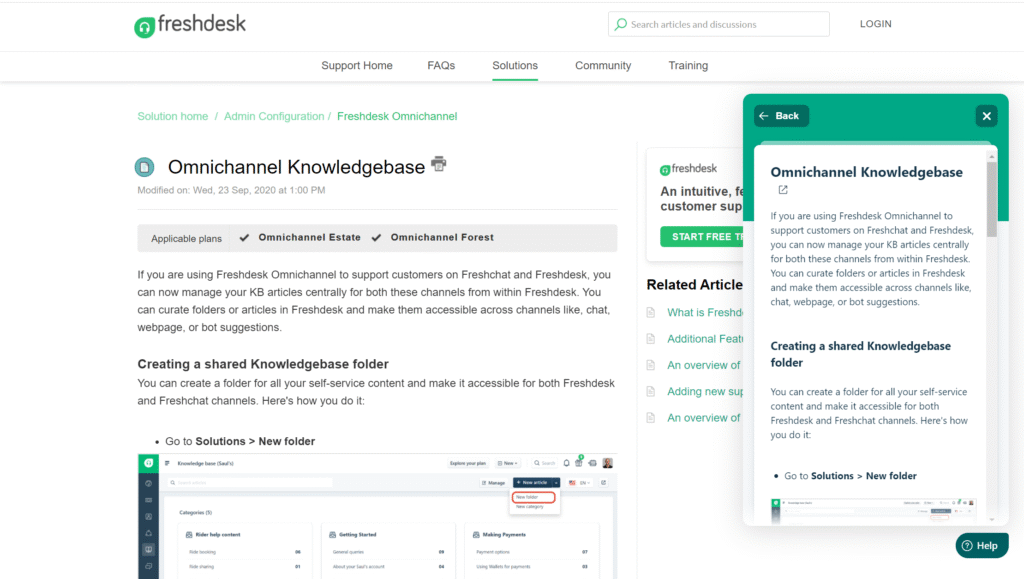
Freshdesk is arguably Zendesk’s biggest rival. It offers a comparable feature set but at a much more accessible price point, including a robust free plan.
| Ideal User | Standout Feature | Pricing Model |
|---|---|---|
| SMBs & Startups | Generous free plan | Freemium & Per Agent |
Core Features and Capabilities: Freshdesk provides comprehensive ticketing with automated workflows, SLA management, and intelligent assignment rules. The platform handles email, phone, chat, and social media inquiries seamlessly.
Freddy AI powers automated responses, sentiment analysis, and predictive contact scoring. The AI learns from your team’s interactions and improves over time.
Collaboration tools include private notes, ticket collision detection, and team huddles. Agents can coordinate responses without confusing customers or duplicating efforts.
Marketplace integrations connect with over 1,000 apps including Salesforce, Slack, and Shopify. Popular integrations include time tracking, CRM sync, and advanced analytics.
Reporting and analytics provide real-time dashboards with customizable metrics. Track agent performance, customer satisfaction, and resolution times across all channels.
Why Choose Freshdesk: It’s the perfect choice for teams needing enterprise-grade power without the enterprise-level price tag. The free plan supports unlimited agents with basic features, making it ideal for startups.
2. HubSpot Service Hub: Best for CRM Integration
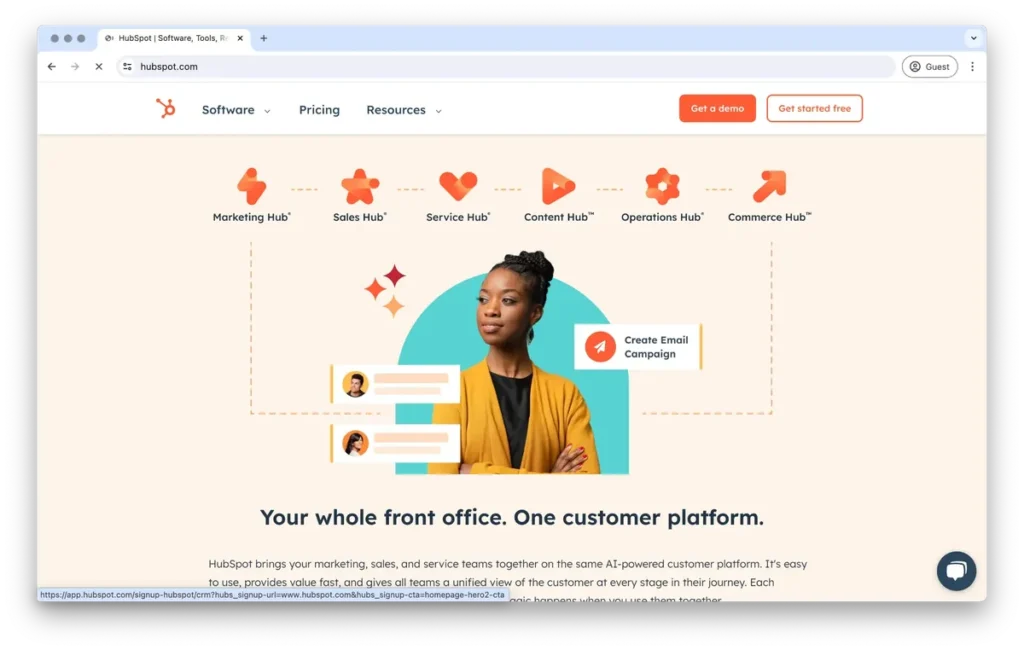
If your business already uses HubSpot’s free CRM, Service Hub is a no-brainer. The native integration provides a complete, 360-degree view of every customer interaction.
| Ideal User | Standout Feature | Pricing Model |
|---|---|---|
| HubSpot CRM Users | Deep CRM integration | Freemium & Per Agent |
Unified Customer Context: Every support ticket automatically connects to the customer’s complete history including sales interactions, marketing engagement, and previous support requests. This context eliminates redundant questions and enables personalized service.
Conversation Intelligence analyzes support interactions to identify trends, common issues, and opportunities for proactive outreach. The system suggests relevant knowledge base articles and previous solutions.
Knowledge Base Builder creates searchable help content with drag-and-drop simplicity. SEO optimization helps customers find answers through search engines, reducing ticket volume.
Customer Feedback Tools include NPS surveys, customer effort scoring, and satisfaction ratings. Automated follow-up workflows gather feedback and route responses appropriately.
Reporting Integration combines support metrics with sales and marketing data. Understand how support quality affects customer lifetime value and renewal rates.
Service Automation includes ticket routing, escalation rules, and response templates. Workflows connect support activities with sales and marketing campaigns automatically.
Why Choose HubSpot: This is less of a standalone tool and more a part of a powerful, unified business ecosystem. It’s a true all-in-one platform for marketing, sales, and service.
3. Zoho Desk: Best for the Zoho Ecosystem
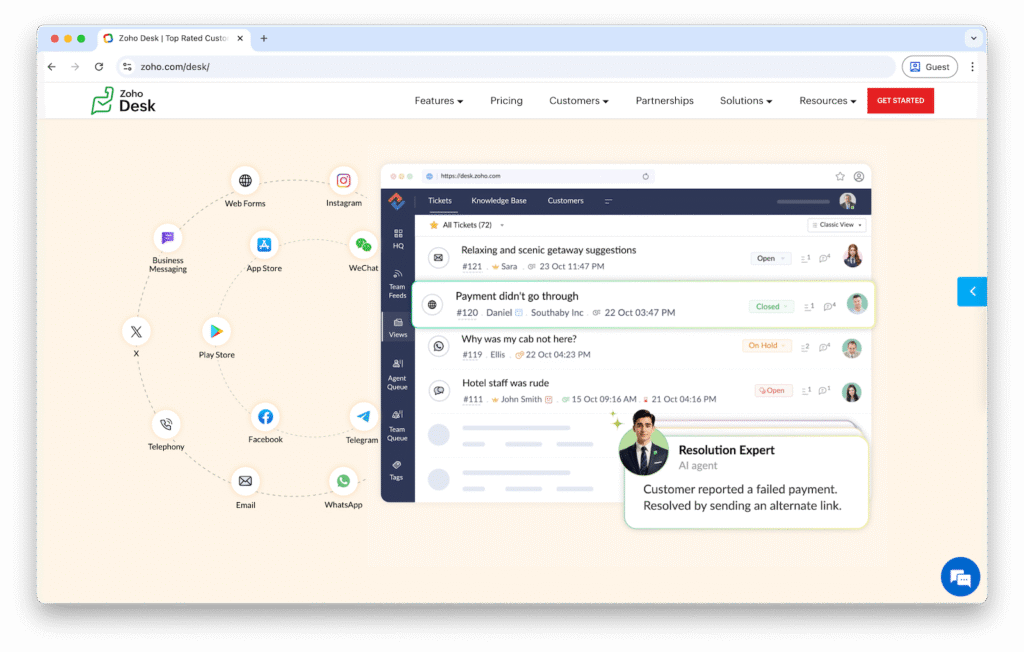
Similar to HubSpot, Zoho Desk’s greatest strength is its seamless integration with the massive suite of Zoho business apps, from CRM to accounting.
| Ideal User | Standout Feature | Pricing Model |
|---|---|---|
| Existing Zoho Users | Part of Zoho One | Freemium & Per Agent |
Zia AI Assistant provides context-aware suggestions, sentiment analysis, and anomaly detection. The AI learns from your business data across all Zoho applications for intelligent recommendations.
Multi-Department Management routes tickets between sales, support, and technical teams with automated workflows. Each department maintains separate SLAs and performance metrics.
Advanced Automation includes blueprints for complex business processes. Create visual workflows that guide agents through multi-step procedures with conditional logic.
Omnichannel Support unifies email, phone, chat, social media, and web forms. The universal inbox maintains context when customers switch between channels.
Custom Functions enable advanced automation using Deluge scripting. Technical teams can create sophisticated workflows and integrations beyond standard features.
Analytics and Reporting include pre-built dashboards and custom report builders. Zia Analytics provides predictive insights and trend identification across support data.
Integration Ecosystem connects with 40+ Zoho applications plus external tools like Salesforce, Slack, and Google Workspace. Data flows seamlessly between business systems.
Why Choose Zoho Desk: If you’re already invested in Zoho, Desk is an incredibly powerful and cost-effective choice. It offers contextual AI and advanced multi-department management.
4. Intercom: Best for Proactive Engagement
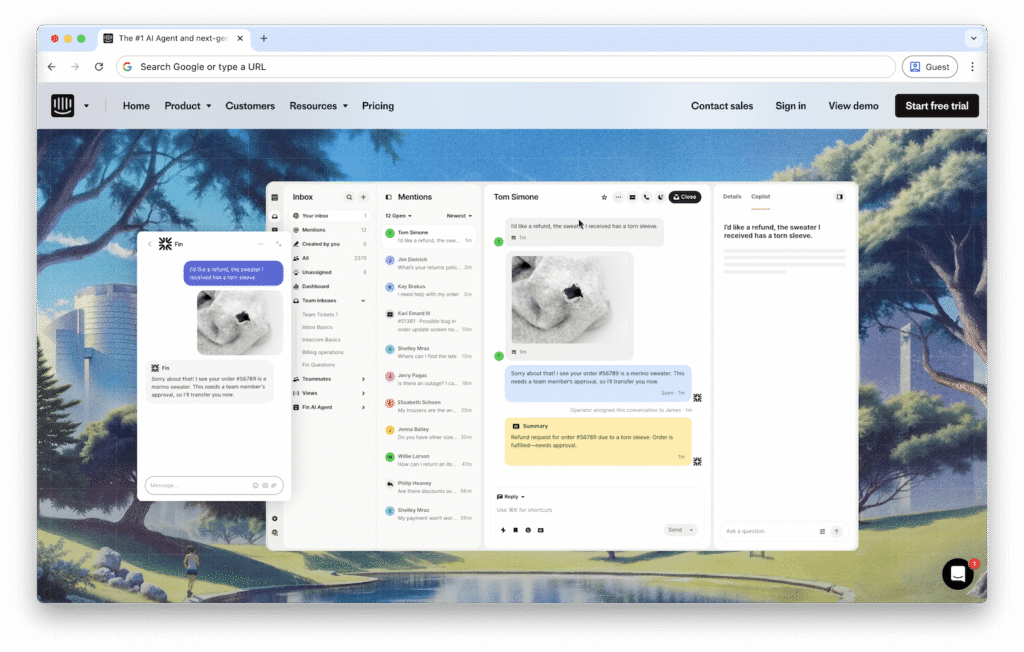
Intercom is more than a support tool; it’s a “conversational relationship platform.” It excels at using bots and chat to engage customers for both sales and support.
| Ideal User | Standout Feature | Pricing Model |
|---|---|---|
| Sales-focused Teams | Proactive chatbots (Fin AI) | Per Agent & Usage-based |
Fin AI Chatbot handles complex conversations using natural language processing and machine learning. The bot provides human-like responses while escalating appropriately to live agents.
Messenger Platform enables in-app messaging, website chat, and email conversations from a unified interface. Customers start conversations anywhere and agents respond seamlessly.
Product Tours and Onboarding guide new users through your application with interactive tutorials. Contextual help appears when users encounter specific features or difficulties.
Targeted Messaging sends personalized messages based on user behavior, location, and engagement history. Proactive outreach converts visitors into customers and reduces support volume.
Team Inbox organizes conversations with assignment rules, collision detection, and internal notes. Multiple agents can collaborate on complex issues without confusion.
Custom Bots use the visual bot builder to create sophisticated conversation flows. No coding required to build qualification bots, support routing, and lead capture systems.
Analytics and Reporting track conversation metrics, bot performance, and team productivity. Understand which messaging strategies drive the highest conversion rates.
Why Choose Intercom: Choose Intercom if your goal is to proactively engage website visitors to drive conversions, not just reactively answer support questions.
5. Help Scout: Best for Simplicity
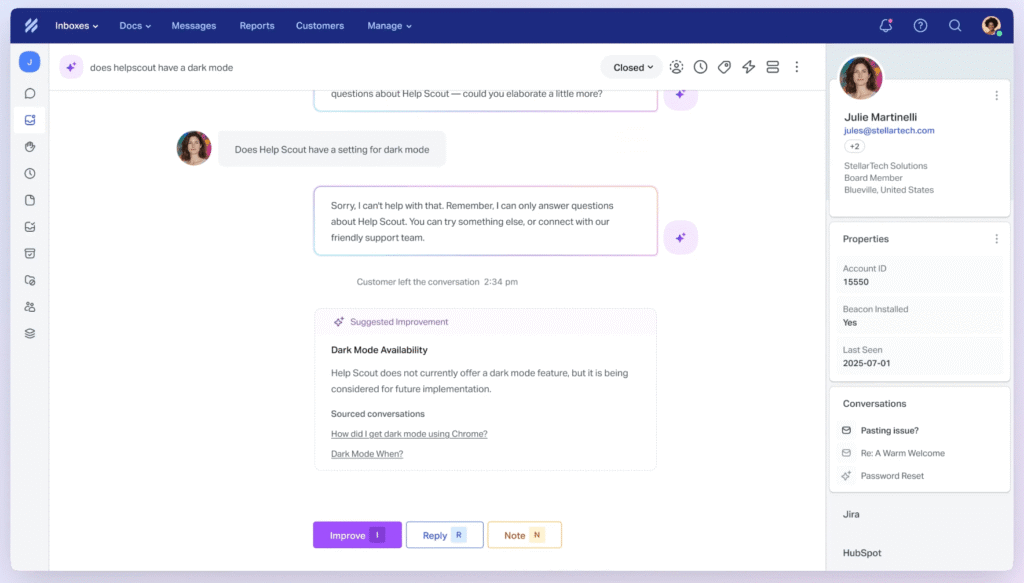
Help Scout is designed for teams who want powerful help desk software that doesn’t feel like a chore to use. It’s clean, simple, and focuses on the human side of support.
| Ideal User | Standout Feature | Pricing Model |
|---|---|---|
| Teams valuing simplicity | Feels like a shared inbox | Per Agent |
Shared Inbox Experience eliminates ticket numbers in favor of natural conversation threads. Customers receive personal emails rather than impersonal system messages.
Beacon Help Widget provides contextual assistance within your application. Smart suggestions appear based on user location and common questions for each page or feature.
Docs Knowledge Base creates beautiful, searchable help content with powerful organization tools. SEO optimization and analytics help improve article effectiveness over time.
Workflows and Automation handle routine tasks like assignment, tagging, and response templates. Simple rules-based automation reduces manual work without overwhelming complexity.
Customer Portal allows customers to view conversation history and submit new requests. The clean interface maintains the personal feel of email communication.
Team Collaboration includes @mentions, private notes, and conversation assignment. Agents coordinate responses and share knowledge without cluttering customer communications.
Reporting and Analytics focus on customer happiness metrics rather than just operational statistics. Track satisfaction ratings, response times, and team performance trends.
Why Choose Help Scout: If Zendesk feels too complex and bloated, Help Scout is the answer. It has all the core features you need, like a knowledge base and reporting, without the clutter.
6. Gorgias: Best for E-commerce
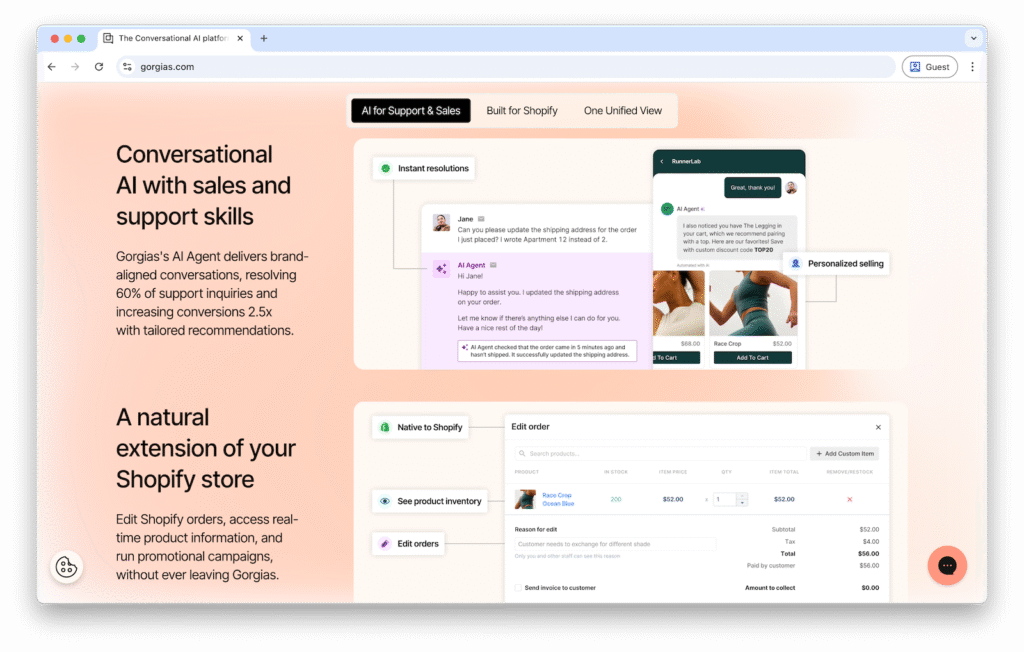
Gorgias is built exclusively for e-commerce businesses, particularly those on Shopify, BigCommerce, or Magento. It pulls customer data directly from your store.
| Ideal User | Standout Feature | Pricing Model |
|---|---|---|
| E-commerce Stores | Deep Shopify integration | Ticket Volume-based |
Order Management Integration allows agents to view complete purchase history, modify orders, process refunds, and update shipping information directly within support tickets. This eliminates platform switching and reduces resolution time.
Revenue Attribution tracks how support interactions affect sales, upsells, and customer lifetime value. Understand which support activities generate revenue rather than just cost money.
Social Commerce Support manages Instagram and Facebook comments, direct messages, and ad conversations. Centralized social media management prevents missed opportunities and maintains brand consistency.
Macro Templates automate common e-commerce responses for order status, returns, and product questions. Pre-written responses ensure consistency while allowing personalization.
Customer Context displays purchase history, return frequency, and lifetime value alongside each conversation. Agents provide appropriate service levels based on customer value and history.
Inventory Integration shows real-time stock levels and product information. Agents provide accurate availability and suggest alternatives for out-of-stock items.
Shopify App Store Integration connects with popular e-commerce tools like loyalty programs, subscription management, and inventory systems. Unified data improves support quality and efficiency.
Why Choose Gorgias: Agents can see order history and even issue refunds directly from the help desk. This saves an incredible amount of time and improves customer satisfaction.
7. Front: Best for Collaborative Inboxes
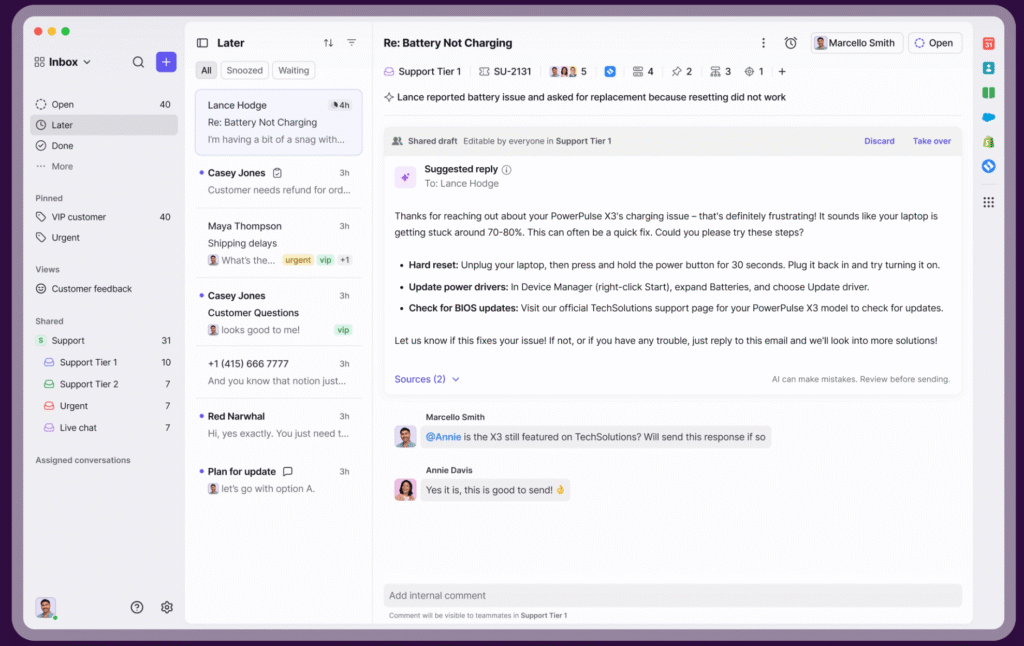
Front redefines the shared inbox. It combines email, social media, and SMS into a single platform that feels like a modern email client, built for team collaboration.
| Ideal User | Standout Feature | Pricing Model |
|---|---|---|
| Collaborative Teams | Modern shared inbox feel | Per Agent |
Team Collaboration Features include @mentions, shared drafts, and internal comments within conversation threads. Multiple team members can coordinate responses without creating confusion or duplicating efforts.
Unified Communication Hub consolidates email, SMS, social media, and live chat into a single interface. Agents manage all customer touchpoints without switching between multiple applications.
Rules and Automation handle message routing, assignment, and response workflows. Complex business logic ensures the right messages reach the right team members automatically.
Analytics and Insights track team performance, response times, and collaboration patterns. Understand bottlenecks and optimize workflows for maximum efficiency.
App Integration Ecosystem connects with CRM systems, project management tools, and business applications. Popular integrations include Salesforce, HubSpot, and Slack.
Custom Fields and Tags organize conversations with business-specific metadata. Track project codes, customer types, or priority levels for better workflow management.
Shared Contacts maintain unified customer information across all team members. Everyone accesses the same contact details and conversation history.
Why Choose Front: It’s perfect for teams that need to discuss tickets internally before replying. You can @mention teammates and share drafts right within the conversation thread.
8. HelpCrunch: Best for an All-in-One Budget Tool
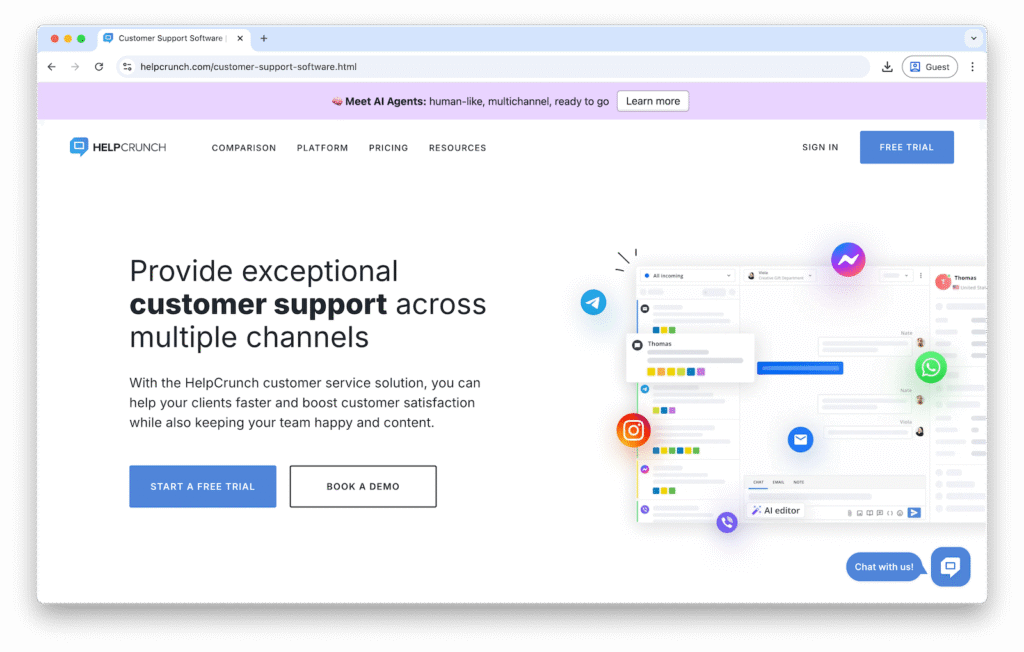
HelpCrunch offers a compelling mix of features—live chat, email marketing, and help desk—in one affordable package. It’s a great option for budget-conscious startups.
| Ideal User | Standout Feature | Pricing Model |
|---|---|---|
| Startups on a budget | Chat, email, help desk | Per Agent |
Integrated Live Chat provides proactive engagement with website visitors using behavioral triggers and targeted messaging. Convert visitors into customers while providing support.
Email Marketing Automation includes drip campaigns, behavioral triggers, and A/B testing. Nurture leads and engage customers using the same platform that handles support tickets.
Knowledge Base Builder creates searchable help content with organization tools and analytics. Track article performance and identify content gaps based on support inquiries.
Customer Data Platform maintains unified profiles combining support history, marketing engagement, and behavioral data. Personalized experiences improve satisfaction and conversion rates.
Mobile Applications enable support management from smartphones and tablets. Agents respond to urgent inquiries and manage workflows while away from desks.
Pop-up and Widget Customization matches your brand design and messaging. Flexible placement and timing options optimize conversion rates without annoying visitors.
Reporting and Analytics track support metrics alongside marketing and sales performance. Understand how different customer touchpoints affect business outcomes.
Why Choose HelpCrunch: It’s a strong contender for those who find Intercom too expensive but still want a suite of proactive communication tools.
9. Crisp: Best for a Modern, Unified Experience
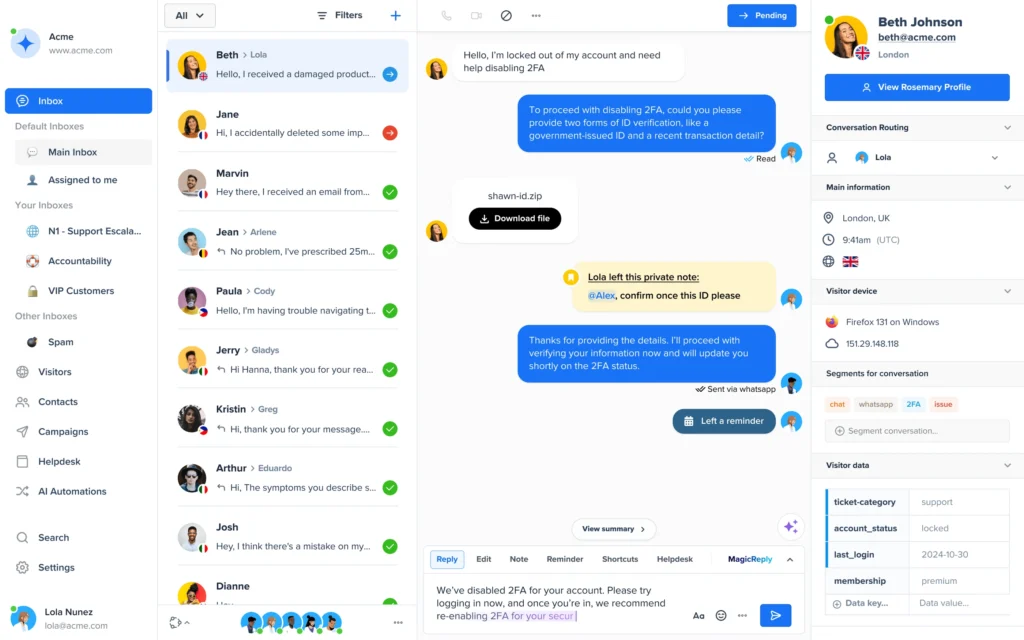
(Source)
Crisp offers a beautiful, modern interface and a wide array of features, from live chat software to a CRM. It aims to be a single platform for all customer messaging.
| Ideal User | Standout Feature | Pricing Model |
|---|---|---|
| Tech-savvy SMBs | Modern, beautiful UI | Per Workspace |
Unified Messaging Platform combines live chat, email, SMS, and social media in one interface. Customers communicate through their preferred channel while agents manage everything centrally.
Magic Browse lets agents see visitor behavior in real-time including pages viewed, time spent, and actions taken. Proactive assistance becomes possible based on observed user difficulty.
Chatbot Builder creates automated conversation flows with visual tools. No coding required to build qualification bots, support routing, and lead capture systems.
CRM Integration maintains customer profiles with interaction history, preferences, and business data. Support agents access complete customer context for personalized service.
Team Collaboration includes assignment rules, private notes, and skill-based routing. Complex inquiries get directed to appropriate specialists automatically.
Knowledge Base provides searchable self-service content with organization tools and performance analytics. Customers find answers independently while reducing support volume.
Marketplace Integrations connect with popular business tools including Shopify, WordPress, and Zapier. Data flows between systems to maintain consistency and reduce manual work.
Why Choose Crisp: Its “per workspace” pricing can be very cost-effective for larger teams, as you don’t pay for every single agent you add.
10. Tidio: Best for AI-Powered Live Chat
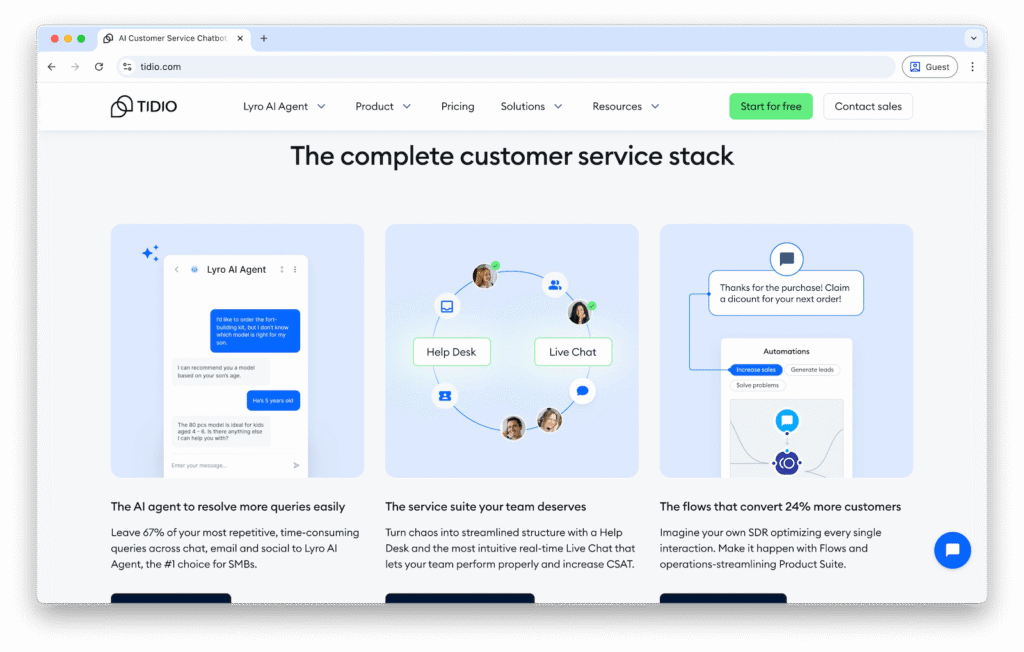
Tidio focuses heavily on AI-powered live chat to automate sales and support. Its “Lyro” chatbot can handle a significant portion of customer queries without human intervention.
| Ideal User | Standout Feature | Pricing Model |
|---|---|---|
| Businesses needing automation | Advanced AI chatbot | Freemium & Per Agent |
Lyro AI Chatbot provides conversational responses using natural language processing trained on your business data. The bot handles complex questions while maintaining natural conversation flow.
Visual Chatbot Builder creates sophisticated automation workflows without coding. Decision trees, conditional logic, and API integrations enable complex business processes.
Live Chat Features include visitor tracking, typing indicators, and file sharing. Seamless handoffs between bots and humans maintain conversation context and customer satisfaction.
Email Marketing Integration captures leads through chat interactions and nurtures them with automated sequences. Convert website visitors into customers using coordinated messaging.
Mobile Applications enable chat management from smartphones with push notifications and quick responses. Agents stay connected to urgent customer inquiries anywhere.
Analytics and Reporting track chat performance, bot effectiveness, and conversion rates. Understand which automation strategies drive the highest business value.
Integration Options connect with popular platforms including Shopify, WordPress, and Zapier. Synchronized data improves personalization and reduces manual work.
Why Choose Tidio: If your primary goal is to reduce support headcount by leveraging a powerful chatbot on your website, Tidio is an excellent, cost-effective choice.
11. LiveAgent: Best for Multi-Channel Support
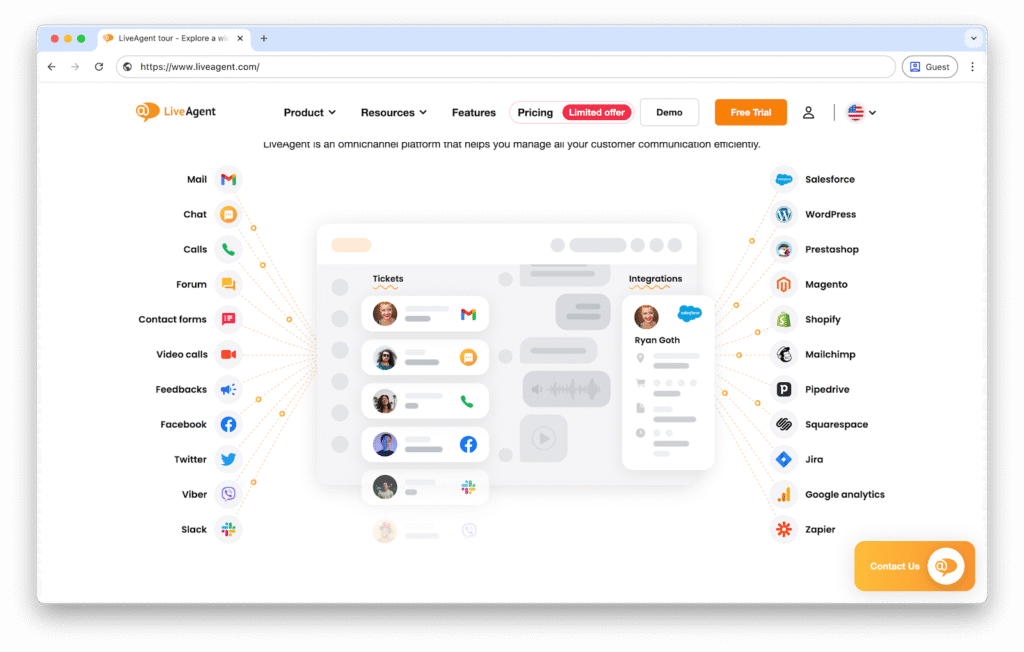
LiveAgent boasts connections to a massive number of channels, including social media platforms like Instagram and Viber. It’s a true omnichannel workhorse.
| Ideal User | Standout Feature | Pricing Model |
|---|---|---|
| Teams on many channels | Widest channel support | Freemium & Per Agent |
Universal Inbox consolidates email, chat, phone, social media, and messaging apps into a single interface. Agents manage customer inquiries regardless of communication channel preferences.
Built-in Call Center includes IVR, call routing, recording, and analytics. Phone support integrates seamlessly with digital channels for complete customer service management.
Social Media Management monitors and responds to mentions, comments, and messages across Facebook, Twitter, Instagram, and other platforms. Centralized management prevents missed interactions.
Automation Rules handle ticket routing, escalation, and response workflows. Complex business logic ensures appropriate handling based on customer type, issue category, and priority level.
Gamification Features motivate agents through achievement systems, leaderboards, and performance competitions. Team engagement improves with competitive elements and recognition.
Knowledge Base Builder creates searchable help content with organization tools and analytics. Self-service options reduce support volume while improving customer satisfaction.
Reporting and Analytics provide comprehensive metrics across all communication channels. Understand performance trends and identify optimization opportunities.
Why Choose LiveAgent: Its key feature is a “universal inbox” that genuinely pulls everything together, ensuring a consistent agent experience no matter how a customer contacts you.
12. Kustomer: Best for a Timeline View
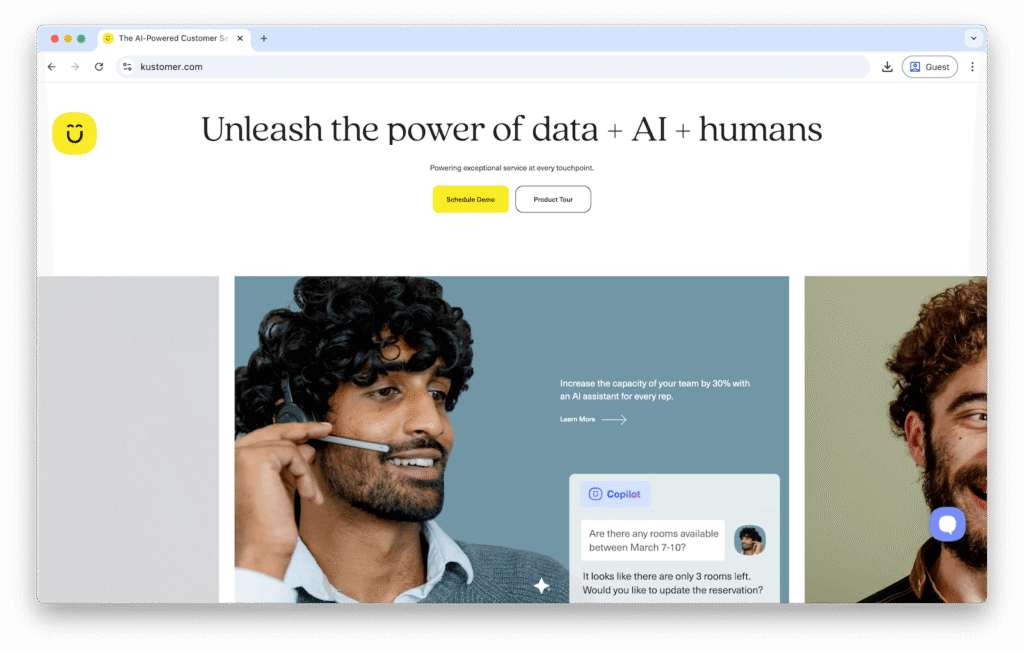
Kustomer, now part of Meta, organizes customer data into a single, comprehensive timeline. This provides agents with rich context for every conversation.
| Ideal User | Standout Feature | Pricing Model |
|---|---|---|
| B2C with many touchpoints | Object-based timeline view | Per Agent |
Customer Timeline View displays complete interaction history including purchases, support tickets, website visits, and marketing engagement. Agents understand full customer context before responding.
Object-Based Architecture organizes data around customers, orders, and custom business objects rather than traditional tickets. This approach provides richer context and better relationship management.
Workflow Automation handles complex business processes with visual builders and conditional logic. Custom workflows adapt to unique business requirements without coding.
Integration Platform connects with hundreds of business applications including e-commerce platforms, CRMs, and marketing tools. Unified data eliminates information silos.
AI-Powered Insights identify trends, predict customer behavior, and suggest next best actions. Machine learning improves over time with increased usage and data.
Collaboration Tools enable internal discussions, case assignment, and knowledge sharing. Teams coordinate responses and maintain service quality standards.
Analytics and Reporting focus on customer-centric metrics rather than just operational statistics. Understand customer satisfaction, retention, and lifetime value impacts.
Why Choose Kustomer: It’s a powerful platform for B2C companies that want to move beyond the traditional ticket-based model and focus on the customer’s entire journey.
13. Gladly: Best for a People-Centric Approach
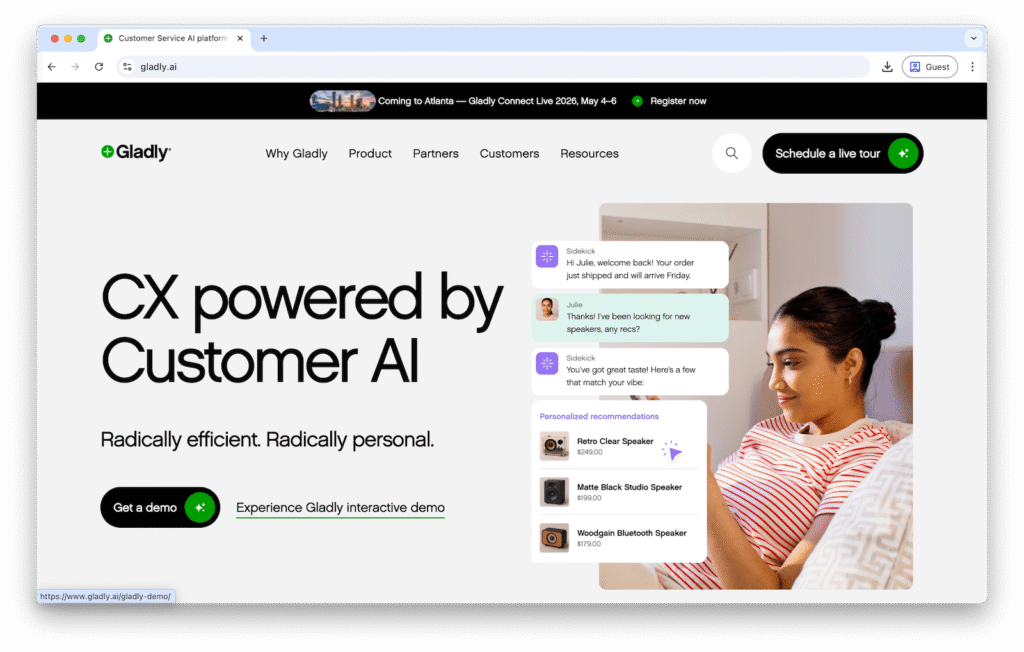
Gladly is another platform that ditches the ticket number. It organizes all conversations by customer, ensuring a single, lifelong conversation thread.
| Ideal User | Standout Feature | Pricing Model |
|---|---|---|
| Retail & Hospitality | Radically people-centric design | Per Agent |
Lifelong Conversation View maintains complete customer interaction history across all channels and time periods. Every agent sees the full relationship context rather than isolated tickets.
Voice Integration includes built-in phone system with IVR, call routing, and recording. Voice conversations integrate seamlessly with digital channels in unified customer profiles.
Hero Agent Assignment enables customers to work with the same agent across multiple interactions. Relationship continuity improves satisfaction and reduces explanation requirements.
Real-Time Collaboration allows multiple agents to work together on complex issues. Internal messaging and screen sharing coordinate responses without customer disruption.
Customer Cards display relevant information including preferences, purchase history, and interaction summaries. Agents provide personalized service based on complete customer knowledge.
Performance Analytics focus on customer satisfaction and relationship quality rather than just operational metrics. Understand which approaches build stronger customer loyalty.
API and Integration connect with business systems to pull relevant customer data. Unified information improves service quality and agent efficiency.
Why Choose Gladly: This is ideal for high-touch industries like retail and travel, where personal relationships and conversation history are paramount.
14. Dixa: Best for Voice and Phone Support
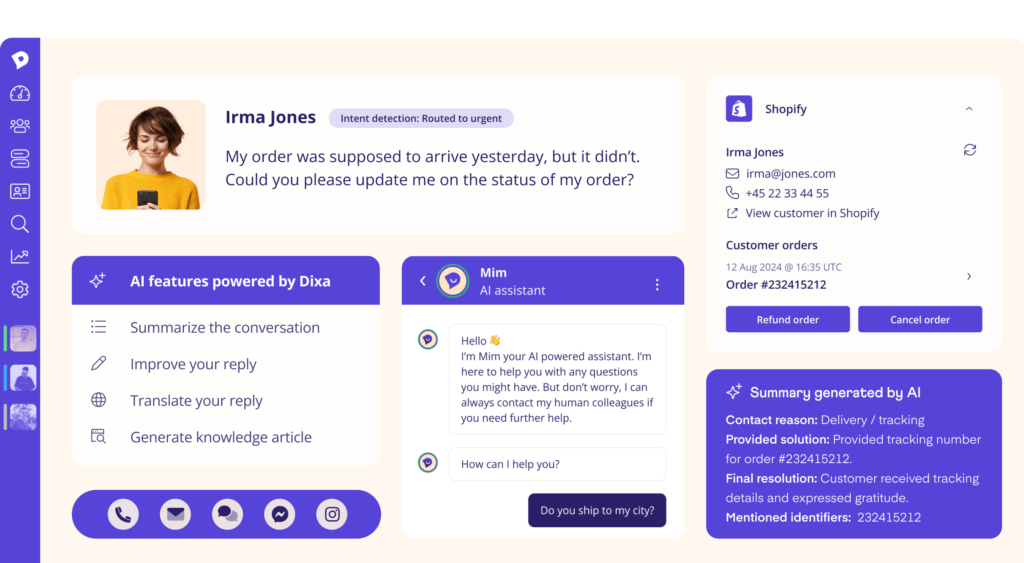
Dixa is a “conversational customer service platform” that excels at integrating phone support with digital channels. It offers intelligent call routing and callback features.
| Ideal User | Standout Feature | Pricing Model |
|---|---|---|
| Voice-heavy call centers | Excellent phone integration | Per Agent |
Intelligent Routing distributes incoming inquiries to the most appropriate agent regardless of communication channel. Skills-based routing ensures optimal matches between customers and agents.
Voice and Callback Features include IVR, queue management, call recording, and scheduled callbacks. Advanced telephony features integrate seamlessly with digital support channels.
Omnichannel Conversations maintain context when customers switch between phone, email, chat, and messaging. Unified conversation history prevents repetitive explanations.
Agent Experience Focus provides modern interfaces and efficient workflows. Reduced cognitive load improves agent satisfaction and performance quality.
Real-Time Analytics display performance metrics, queue status, and agent availability. Supervisors monitor operations and make adjustments to maintain service levels.
Quality Management includes call monitoring, coaching tools, and performance evaluation. Systematic quality improvement programs enhance customer experience consistency.
Integration Ecosystem connects with popular business applications including CRMs, helpdesk systems, and workforce management tools. Unified data improves operational efficiency.
Why Choose Dixa: If a significant portion of your support volume comes through phone calls, Dixa is one of the best platforms for unifying that channel with your digital ones.
How to Choose the Right Zendesk Alternative
Feeling overwhelmed? Don’t be. Choosing the right tool comes down to asking four simple questions.
What’s Your Budget? Be realistic. Start with free options like Freshdesk or low-cost tools like HelpCrunch if you’re just starting out.
What Are Your Channels? Are you email-only? Then a simple tool like Help Scout is perfect. Heavy on social media? Look at LiveAgent.
What’s Your Tech Stack? If you live in HubSpot or Zoho, the choice is easy. If you’re on Shopify, Gorgias is your best bet.
What’s Your Goal? Is it reactive support or proactive sales? This is the key difference between a Freshdesk and an Intercom.
The Final Verdict
Zendesk might be the king on the hill, but it has competitors. The modern customer service platform market is rich with powerful, user-friendly, and worthy alternatives.
For most businesses, Freshdesk offers the best balance of features and value. For those in the HubSpot ecosystem, Service Hub is an unbeatable choice. And for simplicity, Help Scout is a breath of fresh air.
The best advice? Don’t just take our word for it. Sign up for a few free trials and see which platform feels right for your team.
